Discover how to play online poker with the ultimate guide by pro player Ashley Adams. Dominate the virtual tables and become a champion from the comfort of your home.
With years of experience and countless winnings under her belt, Ashley is here to share his secrets and teach you how to become a poker pro, step-by-step.
Here’s what you’ll learn:
If you want to start your journey as an online poker player, this guide will help you get started in the right direction.
So, grab your seat at the virtual table and let Ashley guide you on your journey to poker stardom.
Online poker began in 1998 when Planet Poker debuted. Although it had its glitches and difficulties and it no longer exists, it was the first place where you could play real poker online for money.
Shortly after that, Paradise Poker appeared, then Party Poker and Poker Stars. By 2000, the world had changed forever, and online poker was here to stay.
Today, at any one time, there are likely to be hundreds of thousands of online players competing in more than 100 different online poker rooms for stakes that range from pennies to tens of thousands of dollars.
There are tournaments at every level and cash games of every type.
Online poker follows the exact rules and slang of land-based casinos. The hand rankings are the same; the play of the hand is the same, and there are the same options for betting, raising, checking, and folding.
Even so, here's a quick review:
Ranking of the Hands
- Straight Flush
- Four-of-A-Kind (Quads)
- Full House
- Flush
- Straight
- Three of a Kind (Trips or Set)
- Two Pair
- Pair
- High Card
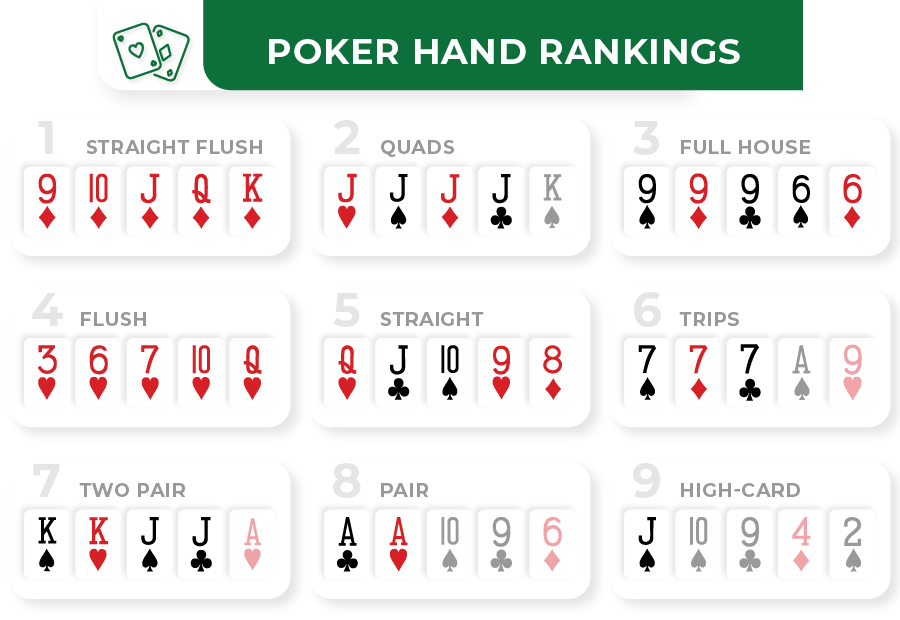
Betting Structure
The online poker game follows the betting procedure as that in a brick-and-mortar casino.
There are two blinds; raises must be by at least as much as the last bet or raise and are played table stakes. The rules on raising and re-raising are the same as in a B&M casino.
Tournament entry fees and prize payouts follow similar structures (though a higher percentage of your money goes into the prize pool online).
In all other respects, the online game follows the same rules and structures you would be familiar with when playing in person.
Pro Tip
For a complete review of these basic concepts, please read my article on poker basics. It covers all the game concepts in depth, and will help you start the right way!
Benefits of Playing Poker Online
There are many reasons for playing online. Here are 8 of the most important ones:
1. It's cheaper than in a land-based public poker room

With no building, cards, chips, tables, heat, dealers, cashiers, or other floor staff, it's cheaper to operate a poker game. So online poker rooms charge the players less to play. Their rake is typically $3 or so per hand instead of as much as $25 per hand in brick-and-mortar (B&M) rooms.
2. It's more convenient

Even if you live near a place that spreads poker games, you can't get more convenient than playing poker on your laptop in your underwear in your kitchen whenever you feel like it.
3. There's a better game selection

Most B&M poker rooms have little or no variety in the games offered. If you're lucky, you'll only have a few games.
But online, with thousands of games going within a finger click away, finding a good game you enjoy playing is much easier.
4. You can more easily keep track of your results and your opponents

You can take notes on your opponents and yourself in a live game. But it's cumbersome and conspicuous.
And your manual record keeping will be intrusive to your play, is likely not thorough, and may not be accurate.
With online heads-up displays (HUD) like Poker Tracker 4, note-taking is automatic, complete, easy, and invisible to your opponents.
And, your games can be preserved, with the results of your play and your opponents fully sortable, so you can analyze them later when you're not playing.
5. You can play more than one game at a time

This is not necessarily a plus, as there is the risk that, as you increase the number of games you play, you diminish your ability to win in each game.
But as you learn the skills necessary to become a winning online poker player, and as you learn to apply those skills profitably, you can multiply your winnings as you play more games.
6. You can fit your game into a smaller bankroll

Brick and mortar casinos rarely have stakes with lower than $1.00/$2.00 blinds. Many online poker platforms have stakes as low as $.01/.02 and $.02/.05.
Similarly, it's hard to find tournaments in B&M rooms with less than a $25 buy-in. Most these days are at least $100.
But online, you can find dozens of daily tournaments for $5 or less and even freerolls with cash payouts.
It's not an exaggeration to say that if you are a profitable player, you can start your career with a bankroll of $200, and with careful management of your funds and very skillful play, keep building it up until you have enough to support yourself (meagerly perhaps) by playing poker.
People have done it. You can too!
7. It's safer to play online

Ever win a lot of money in a regular poker room? Ever do so at night, get paid in cash, and then have to walk through the room, out the door, and then to your car?
Ever travel with a lot of cash to enter a tournament or a ring game? I was robbed of my poker bankroll on the streets of a major city.
No fun, believe me. It wouldn't have happened if I had only played online.
Your online poker winnings go right into your account with the platform. And then, you can transfer the money to an online financial institution or pay directly to you.
Either way, there's no risk of being robbed of your bankroll – because there is no physical bankroll to be stolen.
8. Less risk of getting cheated

There is a risk of getting cheated at any activity involving money.
Poker also has a reputation for this, though, from my experience, the chance of getting cheated at poker is minuscule. Even so, it is a concern, as players in both land-based poker games and online have been cheated (rarely).
Online poker has one significant advantage over land-based games in this regard.
Unlike in regular games, when the play record disappears after the hand is over and a deck is reshuffled, all games are recorded online.
Hand histories can be pulled up long after the game has been played. They can be reviewed. They can be studied. Patterns of play can be detected.
There is documentation to demonstrate cheating. This indeed acts as a deterrent, in my view, as it makes it more likely that the suspected cheater will be caught.
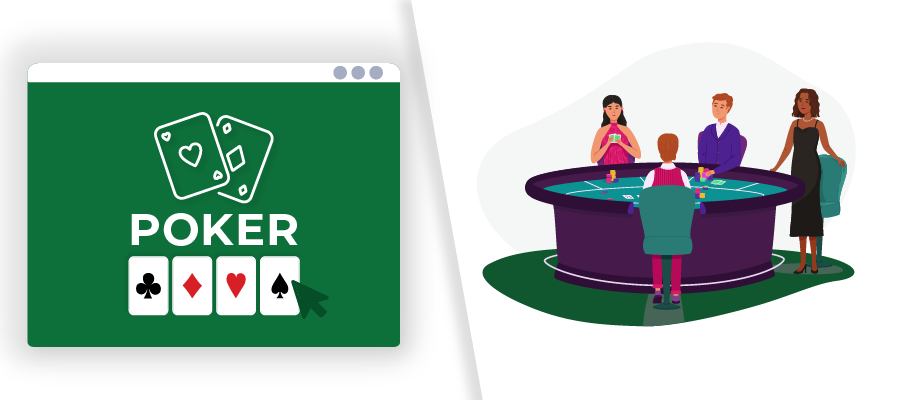
Though the structure and rules are the same, the two games have some other key differences.
Play is faster
You don't need to deal or handle the cards or the chips physically.
There's no conversation with the dealer, and except for online chat, there is no talking between or among players to slow the game.
There are no interruptions or distractions like waitresses bringing drinks. There is also a time clock.
For example
In cash games, on Poker Stars, you have 10 seconds to act pre-flop, and 15 seconds to act when facing a raise. (You have a time bank that grows as you play, if you don't exceed your time limits. That gives you a maximum of 30 seconds pre-flop and 60 seconds after the flop.)
This means you get more hands per hour – often double what you would get in a B&M casino. That's good if you're a winning player, as you get more opportunities to profit.
Play tends to be more challenging at the same level
Games online are more complex to beat than games of similar stakes in a brick-and-mortar room.
There are a few reasons why this may be so, but chiefly it is because good players have more tools to get better and make a living online.
Even so, since there are so many lower-staked games available online that are not available in a brick-and-mortar casino, a good but not great player can still find profitable games – just at lower limits.
They can use these games to build up their bankroll and develop their skills as they work up to the bigger and more demanding games.
Few, if any tells are available online
This may seem obvious. It's much, much more challenging to read players online.
You're playing against an unmoving avatar.
There's no face to read, no hand actions to study, no foot shifting, eye glancing, mouth pursing, etc. If much of your game is based on your read of your opponent, you'll need to adapt to the largely tell-less world of online poker.
Even so, there are some tells that may be useful. They are related to the time a player takes to act, and they're called, not surprisingly, "timing tells ."
This is easily faked, of course, but generally, delay indicates indecision – either a reluctance to call or having hit a strong hand and deciding on how to play it. An instant bet after the flop, turn, or river sometimes indicates a bluff – as the player acts sure and confident to "fool" opponents.
But, again, unlike tells in person, it's tough to make accurate reads when playing online.
Easier to go on a tilt
While bad beats, a rush of good cards, interpersonal fights, and other dynamics in a B&M room can cause a player to tilt, there's no question that there will always be more time between incident and action in a B&M casino than when playing online.
Suffer a bad beat in an online game, and you can instantly jam your next hand with one-microsecond keystroke. BOOM, you're broke.
At least in a physical casino, it usually takes a few seconds to accomplish the same thing, giving the tilting poker player a few seconds to think, slow down, and avoid disaster.
Different risk of distraction
There are surely more auditory and visual distractions in a public poker room than in the privacy of your own home.
People getting up from the table, walking by, servers bringing drinks and food, announcements on the speakers, slot machine noise, crapshooters shouting, etc.
You can set up an utterly calm home environment, relaxing, and focused on playing poker. However, a home environment can also include kids, pets, a spouse, meals, and the distractions of living your life, in a way you never do in a public room.
Accordingly, your level of distraction online is almost completely within your control. For your online poker play, I suggest you set aside a private, quiet area free of distractions.
You have many options, so you want to make the right choice. Here is a list of factors to consider:
How secure and reliable is the online poker platform?
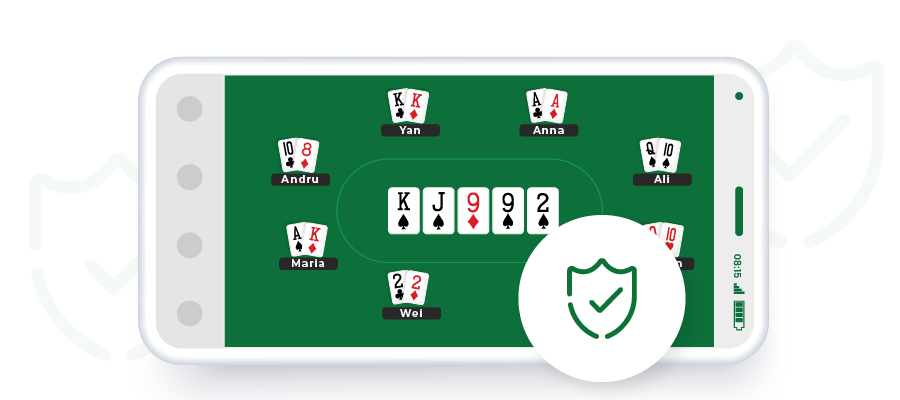
You can do your research on this. I recommend going for the biggest sites. They are subject to the most scrutiny.
And now, with 20+ years of experience, those who have attracted the most business are indeed well-vetted and, in my opinion, safe.
Do they offer the games you want?
This site is geared toward the no-limit hold 'em player. If that's you, look to see what stakes of no-limit hold'em are offered at these sites.
How many games do they have at the levels you'd like to play? If you are interested in playing other games, see which sites also offer those games.
With so many options, take some time to pick the site that's right for you. And you don't have to be loyal. You're free to be fickle and promiscuous.
Go ahead and move from site to site!
User Experience and Reviews

Ask around. See where people you know play. Ask them how it's been for them. You can also go online and read many reviews from poker players. Be picky and demanding. It's a buyer's market!
Payment options
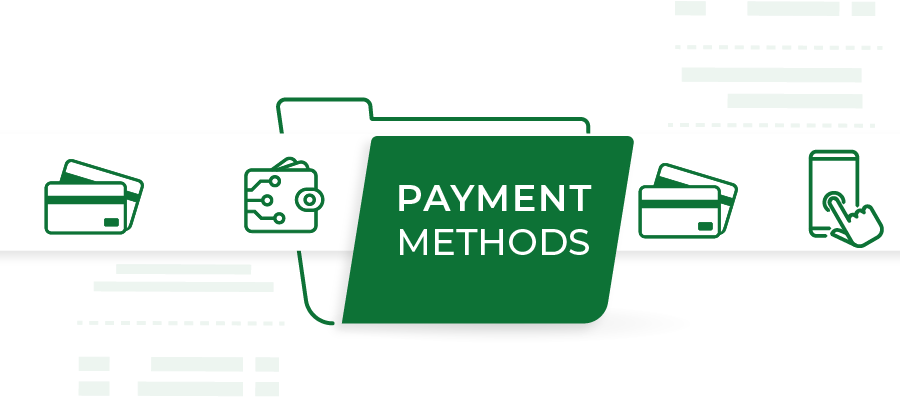
Each site has its lineup of ways to deposit and withdraw money.
There are e-wallets, credit cards, bank wire transfers, and other wiring services that don't involve your bank, like Western Union and MoneyGram, and even cryptocurrency.
Find out what's best for you.
Check out the fees and the bonuses, including the percentage of the match and the maximum. The competition for players is fierce, so bonuses can be substantial.
Customer support

You may have problems with your software, depositing or cashing out, or suspicions of others colluding or cheating.
You need to have an easy way of contacting someone from the site. The best is instant chat, or phone, with a person available to correspond with 24/7.
The worst is a site that never is available and doesn't respond to messages. Once again, reviews from others are the best way to see which sites are best.
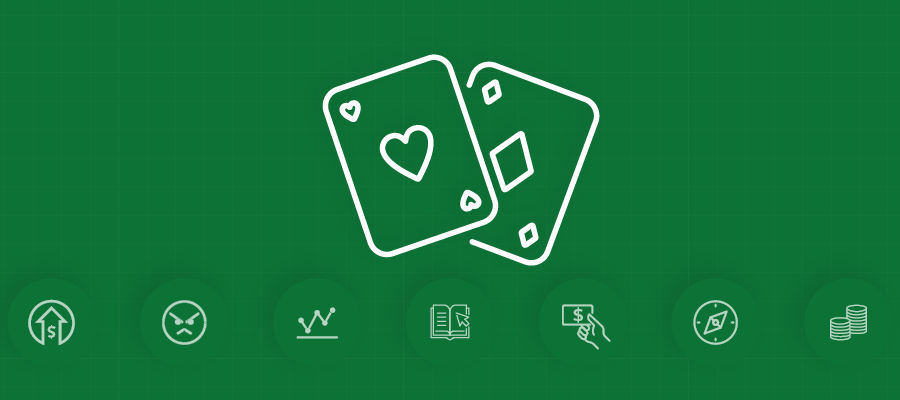
If you play online, you'll want to do what you can to become a winning player. Below I list 13 ingredients to successful online poker play.
1. Be Selective: Play Only the Most Profitable Starting Hands
Want to spot the biggest loser in a poker game? It's almost surely the player who wins the most hands.
Ironic, no?
But if you are winning the most hands, you are probably playing the most hands. And if you're playing the most hands, you are almost surely losing the most money in the hands that don't win.
The key to winning at poker is not to play the most hands or even win the most per hour. It's to make the correct decisions on how to play the hand you're dealt. Most hands are not worth playing.
Accordingly, the best decision is to fold pre-flop, saving money for those few hands likely to have the most significant advantage over your opponents.
That means playing selectively and aggressively.
Here's a list of the most potent hands in hold'em. Most of the time, especially when you are in an early position, these are the hands you should be playing:
- A-A
- K-K
- Q-Q
- J-J
- A-K suited
- A-Q suited
- A-J suited
- A-T suited
- K-Q suited
- A-K unsuited
- A-Q unsuited
Please note
These are all hands you can comfortably raise in middle or late positions. You can also raise some hands like A-A, K-K, Q-Q, and AK in an early position, where you will be one of the first to act post-flop.
In middle and late position, or in games where few players tend to raise pre-flop, you can also play hands like other pairs; suited aces; suited connectors like K-Q, K-J, Q-J, and J-T; and unsuited "Broadway" cards like K-Q and K-J.
2. Tend to Be Aggressive
You want to tend toward being the aggressive player that others are looking out for.
That means raising with your top cards and re-raising (3-betting) with your strongest holdings.
That doesn't mean you won't be limping along occasionally – especially when others are doing the same thing.
You sometimes want to limp with a drawing hand, hoping to improve the flop or make your hand on the turn or river (when the pot odds make sense).
But, in general, you should be pushing the action rather than being drawn along behind others who are doing so.
3. Calculate and Consider Pot Odds, Drawing Odds, and Implied Odds
When you must draw a card to hit a winning hand, you must understand how to calculate whether you have the proper odds to do so.
You should not make these decisions based on a hunch or whether you think you've been running good or bad.
The calculations are generally straightforward.
You should know how to do this in your head; and then do so when deciding whether to call, fold, or raise.
Pot odds represent the ratio of the immediate size of the pot to the amount you must call to see the next card. You should generally call when your odds of hitting your card are better than the pot odds.
For example
If you are on a flush draw, the pot is $100, and you are facing a $10 bet, it almost indeed makes sense to call that $10 if you are sure to win if you hit your flush.
That's because the odds of drawing that flush are about 4 to 1 against you, and the pot you will win means you are getting 11 to 1 pot odds.
But if the pot is only $20, you should probably fold to that $10 bet, as the odds are still 4 to 1 against you, but you're only getting 3 to 1 odds if you hit your hand.
The implied odds are especially important in no-limit hold'em.
This is the ratio of the bet size you must call, not to the immediate size of the pot but to the eventual size you expect to win if you hit your card.
For example
If the pot after the betting on the turn stands at $100, your opponent bets $100, and you are on a flush draw, you wouldn't have the pot odds to make the call.
However, if you take into consideration that your stacks are $5,000 deep. Your opponent is highly distrustful and liable to call any bet you make on the river, even if another flush card hits, then you should call that turn bet based on the likelihood that you will win his entire stack of $5,000 when you hit.
If you didn't hit your hand, you'd fold to a bet, losing just the $100 for the call and nothing further. But in the 1 time out of 5 or so that you hit your flush, you'd likely win $5,000.
That $5,000 to $100 is 50 to 1 and is called your implied odds. You also need to think about that to be a successful no-limit player.
5. Characterize Your Opponents
Different players, different playstyles.
Some are loose. Some are tight. Others are aggressive. Some are quite passive, calling and rarely initiating the betting or raising.
You need to learn to characterize your opponents in simple, easy-to-remember ways.
Online, you can do this in player notes and by looking at how they have played hands in the past – with various player tracking tools.
You can display it in your Heads Up Device (HUD) to remind yourself during the play of your hand.
You need to consider these characteristics as you plot your strategy against your opponents.
Though you will tend to play straightforwardly (especially if you are playing multiple games simultaneously), you will deviate from that straightforward play based on your reading of your opponents.
For example
If you are playing in a game full of passive players, who seldom enter the pot for a raise, you can widen your range to include more speculative hands.
You can limp more in the middle and early position since there is a smaller chance you will face a subsequent raise or 3-bet.
Similarly, if the player to your left is a loose-aggressive player (LAG for short), you will narrow your playing range, as you will likely face a raise much of the time.
5. Add Deception to Your Play
Your better opponents will be keeping track of your tendencies.
So don't give them a clear picture.
If you always play the same cards, in the same situation, the same way, it will be like playing with your hand exposed, and your better opponents will be better able to exploit you.
Vary your play, adding some bluffs to your range and sometimes playing aggressively with hands you would typically limp with.
This will balance your range, keeping your opponents from knowing what you have and making it harder for them to exploit you.
Similarly, with a balanced range, when you hit a monster with cards outside your expected typical range, you will be more likely to get paid off by your observant opponents, as they will be surprised by your holding.
6. Don't Fall in Love with Your Hand
When you are a selectively aggressive player, giving up on a hand you have waited patiently to play is hard.
You've folded 18 hands in a row, now have Ks Kd, raise 4BB in late position, and get three callers.
The flop is As Qs 9h, and you face an opening bet and a call from two tight players.
Do you think your Kings are still good? Maybe they are.
But you're probably against at least a pair of Aces, and probably a flush draw, and maybe both, making you a considerable underdog.
You should indeed fold those Kings, though you waited patiently for them.
7. Take Into Consideration Your Table Position
Understanding your position at the table is one of the key pieces of poker strategy you need to learn.
Simply put, late position is better than an early position.
You can play more hands from late position than from early position for a few reasons, chiefly that you are less likely to face a raise once you enter the pot, and you can better size up your opponent's strength before you have to act on future rounds.
Accordingly, you can generally play a broader range and tend to be more aggressive from the late position, even as you play a narrower range from the early position.
8. Bankroll: Don't Play With Scared Money
Online sites allow you to fit your bankroll to an appropriately staked game, however small it may be.
Just starting and have little to gamble with? Go for freeroll tournaments or the micro-stakes games of $.01/.02 or $.02/.05.
Have a much larger bankroll? Jump right into the $250, $500, or $1,000 tournaments and $5/10 no-limit games.
A safe rule of thumb is a playing bankroll of at least 100 buy-ins (generally 10,000 big blinds) times the big blind and 100 tournament buy-ins.
So, if you only have $200, stick to $.01/.02, freerolls, and $2 or smaller tournaments.
Have $2,000? Feel free to play $.10/.20 cash games and $20 tourneys.
Have $5,000? you can play $.25/.50 and $50 tourneys.
Of course, you can vary this based on how readily you can replace your playing bankroll and how risk-averse you are.
9. Invest in Poker Tracking Software
Poker tracking software and heads-up displays (HUD) give you a valuable tool that is not available in live poker games – the ability to keep track of your play and the play of your opponents.
This can give you instrumental insight, available as you play, into how you can best exploit your opponents.
Keep in mind
The two most popular trackers are probably PokerTracker 4 and Hold 'em Manager 3.
They'll show you everything you'd want to know about your opponent's tendencies (based on how you have played against them), including how frequently they voluntarily enter the pot, how often they raise pre-flop and follow up their pre-flop action with a continuation bet on the flop, and how often they call a bet on the river.
You'll also be able to take notes on their play, which you can reference in future hands.
HUDs are allowed on most, but not all, of the bigger sites.
Some sites now require that players remain anonymous. Ensure you understand the rules on the sites you'll be playing on before investing in this software.
10. Learn from Others
Knowledge is power. It makes sense to tap into the poker knowledge of others.
There are many ways to do this. There are old-school poker books and articles available on many sites. (I've written a lot of articles and three books).
There are training sites that offer instructional videos, articles, and personal coaching.
You can also hire a poker coach – available online, on the phone, or even in person. The most popular training sites that also offer to coach are among the following:
- RedChipPoker
- Upswing Poker
- Raise Your Edge
- Run it Once
- Pokercoaching.com
It is a buyer's market, so be selective.
Read the reviews, talk to others in the poker world, and try out the free material they all make available before you decide to plunk money for a monthly service charge or a one-time fee.
11. Make a Quiet Place to Play
Sure, you can play from your laptop anywhere.
But if you want to become good at this game and consistently make money at it, you should treat the endeavor seriously.
You should find a quiet place in your home, free from the distractions of your regular life, where you can set up a desk and a screen (or more than one if you begin to multi-table).
Ideally, you'd use this as an office – a place to focus on the task at hand, playing winning poker!
12. Move Up in Stakes Gradually
It's your money, of course.
You can start right in at the highest level if you want. But the more prudent route, and the one I followed and most successful players have followed, is to start low and move up gradually as you demonstrate and improve your skills.
Keep track of your results egolessly.
Don't discount that horrendous session when you hit four bad beats, went on tilt, and blew a ton in a fit of rage. Count it just as you would have counted hitting a one-outer on the river and stacking two poor saps who were ahead the whole way.
When you've demonstrated you can beat the game at one level, move up to the next. When your bankroll takes a beating, move back down and build the bankroll back up. Forget your pride.
Seek games with beatable players, and keep an eye on your real results as you test the tougher waters of bigger-stakes games.
Many players think that they may eventually be able to quit their job and just play poker full-time. I've written extensively, but I'll keep it short here.
It sure is appealing, in the abstract, at least. Imagine making a full-time living playing a game you love.
Yes, it is an attainable goal for some. Poker is a game of skill.
Develop your poker skills sufficiently, and, at least theoretically, you can earn enough money from those without the will or the skill and make a living from it.
And there are at least some who do exactly that – or who claim they do.
So why not you?
Let me give you a simple list of steps to follow if this is your goal.
And then, I'll finish with my recommendation, based on over 30 years of earning money at poker.
When you start, have a steady, reliable source of income other than poker.
As you begin this quest, you don't want to depend on poker for your necessities.
That means you should have a steady job you rely on for the income it takes to support yourself.
This steady job will also provide some good structure to your life – something you will need to help discipline the bad habits of play that many players get into, which destroys their ability to earn a living at poker.
Play in your spare time
Play poker around your work schedule – not the other way around. Figure out how much relaxation you need, then schedule yourself to play. Set limits.
Start with short sessions – no longer than an hour or two.
Expand the hours of continuous play as you feel comfortable doing so. Don't play tired. Don't stay up all night playing poker.
Limits, grasshopper, limits!
Keep accurate results of your sessions
Include the site, the time, the duration, the game, and the win/loss. Keep results for each session and aggregately.
There are programs on HUDS and other software that do this for you.
Be honest!
Don't discount big losses. Don't discount sessions that you think were atypical or when you went on tilt. Count it all.
Don't draw any conclusions until you have 10,000 hands
It's tempting to string together a few winning sessions and think you are crushing the game.
You may be. But you need a good solid 10,000 hands to know for sure. Resist the urge to rush this process.
Don't think of quitting your day job until you have saved up half a year's worth of living expenses
The biggest reason businesses fail is undercapitalization. Don't do this to yourself. Here's an example of how you should go about it.
Keep track of your living expenses.
Let's say you're living cheaply (but not at home in Mommy's basement) and spending $3,000 a month in very modest circumstances (that almost surely means no car, travel, or meals out).
After 10,000 hands, you'll need $18,000 in the bank from poker for living expenses and a win rate of roughly $18 an hour.
If you're doing this by beating the $1/2 game, you'll also want a playing bankroll of at least $20,000 to be on the safe side. You may be able to quit your day job to live a relatively spartan life with $38,000 or so in the bank and a win rate of $18 an hour.
I'd also add that even if you can do this, you might find that after grinding like this for 10,000 hands, the idea of playing poker for a living no longer appeals to you.
You might think having a straight job earning $40,000 and playing poker for extra income is better.
Finally…
Playing poker online can be enormously fun as well as remunerative. Some can make a living at it.
Very few can make an excellent living from it. But, I think it's best as a part-time job that supplements your income.
When it's not the sole means of support, some of the stress and pressure of the play are taken out, making it more pleasurable.
This is especially true if you are supporting a family.
And just so you know, even the world's best poker players – those who consistently win major tournaments– also recognize this.
Many regularly seek non-poker-playing opportunities to earn money or other ways to diminish their risk of playing poker for a living – like endorsements, sponsorship, backing, training, public speaking, and so on.

Bonuses
Casinos
Games
Academy
News
Shop
NEW Q&A
Sweepstakes


































